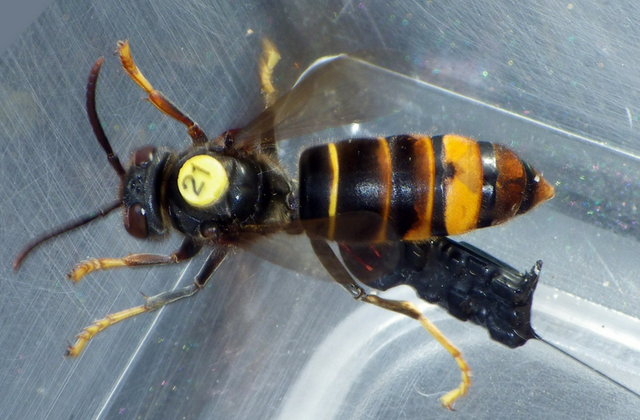On today's blog we look at the publication of the fisheries white paper, Asian Hornets, Ofwat announcement of new requirements for water companies and challenges for rural areas.
Fisheries white paper published

The Government has published its ‘Sustainable Fisheries for Future Generations’ white paper this morning, which sets out plans for a sustainable and profitable fishing industry that will regenerate coastal communities and support future generations of fishermen.
It looks at how, for the first time in 40 years, the UK will be an independent coastal state and will regain control of our waters and natural resources, as well as the flexibility to negotiate with other countries and ensure stocks are fished sustainably.
The launch of the white paper has been positively covered by BBC News, BBC Radio 4’s Today programme, the Telegraph, Times, Express, Guardian and Herald, amongst others.
Writing for the Times’ Red Box, Environment Secretary of State Michael Gove said that regaining control of its fisheries will be a great opportunity for the UK, allowing us to put in place policies that are which are better for our marine environment and our coastal communities.
And speaking on BBC Radio 4’s Today programme this morning, he went on to say: “At the moment less than half of the fish in British territorial waters is caught by British vessels. When we leave the EU under international law we become an independent coastal state … we can decide who has access to our waters, and we can ensure a greater proportion of the fish in our own waters is caught by British vessels, landed in British ports and processed by British businesses.”
Key industry figures have spoken favourably about the content of the white paper, including Barrie Deas, CEO of the National Federation of Fishermen’s Organisation, who said it was “a broad vision for post-Brexit fisheries that is clear and cogent” and Scottish Fishermen’s Federation Chief Executive Bertie Armstrong, who has said it “enshrines the important elements that we have been arguing for to forge a sustainable future for our industry”.
The publication of the white paper has been met with criticism from the Scottish Government, who say they have not been consulted on its contents. This is not true, as the UK government has been talking to the Devolved Administrations – including the Scottish Government - at Ministerial and official level about these issues since the referendum result, and intensively since January.
To be clear, the launch of the white paper is also the launch of our consultation on its content – it is not a conclusion on how we will move forward. Now that we have published our proposals we want to hear from the Scottish Government, as well as other administrations and the wider industry, on how we can make the most of the opportunities outside the EU.
Tiny radio trackers to help fight against invasive Asian Hornets

The Press Association has this morning picked up on research from the University of Exeter, which could help us to quickly eradicate invasive Asian Hornets should further outbreaks be spotted in the UK.
The Defra-funded research showed that by tagging hornets in France and Jersey with tiny electronic trackers, scientists were able to track them back to their nests in and stamp out the threat.
The Hornets were captured and then cooled down before a tag was fitted with a thin thread around their abdomen, before being given time to recover in a flight cage. They are then released and tracked back to their hidden nest and, once located, the nests and hornets within them can be destroyed.
The Asian hornet is smaller than our native hornet and poses no greater risk to human health than a bee. However, they do pose a risk to honey bees. They were most recently sighted in the UK in April, in Lancashire.
Nicola Spence, Defra's deputy director for Plant and Bee Health, said:
This work is key for ensuring a rapid response to Asian hornets when sightings are confirmed, and in future bee inspectors will be able to use this technique to take swift action.
Dr Peter Kennedy, who led the University of Exeter team, said:
Our new method of tracking offers a really important new tool to tackle the spread of this invader, providing an efficient means of finding hornets' nests in urban, rural and wooded environments.
Ofwat announces new requirements for water companies
Today’s Times reported on new requirements from Ofwat’s for water companies to show how executive pay is linked to performance and to prioritise the interests of customers. These are part of changes to Ofwat’s 2019 price review methodology, announced yesterday following a consultation with a wide range of stakeholders.
The story was widely covered, including in The Guardian, Financial Times, The Express and BBC News.
Speaking about the announcement in the House of Lords yesterday, Lord Gardiner said:
The government supports Ofwat’s action to increase transparency of executive pay and bonuses, which must be based on better services for customers.
Ofwat’s requirements of companies are very clear on the issue of performance-related executive pay. We are willing to take regulatory action to support Ofwat’s reforms if water companies do not readily co-operate.
Water companies now have until 3 September 2018 to set out how they will meet these new requirements. Ofwat’s press release can be read in full on their website .
Challenges for rural areas
This morning there is coverage in the Express following a report commissioned by the Local Government Association, which says England’s countryside is facing a ‘perfect storm’ of threats that challenge the survival of villages across the country.
This report claims there is a "deepening divide" between rural and urban areas as a result of unaffordable housing, poor internet connectivity, and skill gaps.
Government is aware of the challenges faced by some rural communities and is committed to making sure they have the right infrastructure and services in place to prosper.
Our new national planning policy framework – coming into force this summer following a consultation – will transform the planning system, ensuring we are building the homes the country needs as well as the local services needed by communities.
We have also raised the availability of super-fast broadband from 45% of premises in 2010 to 95% by the end of 2017, and we have committed to making high speed broadband available to all by 2020.
A government spokesperson said:
With nearly a fifth of us living in the countryside, generating almost £250 billion for our economy, we are determined to make sure our rural communities prosper.
That’s why we are driving forward high speed broadband in the most hard to reach areas, strengthening planning rules to create more affordable homes, and supporting the creation of more than 6,000 jobs through our dedicated fund for rural businesses.